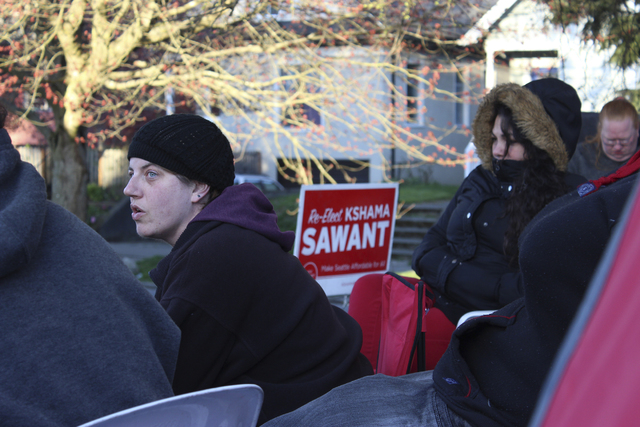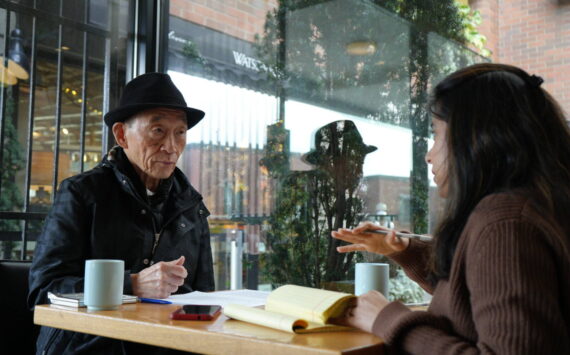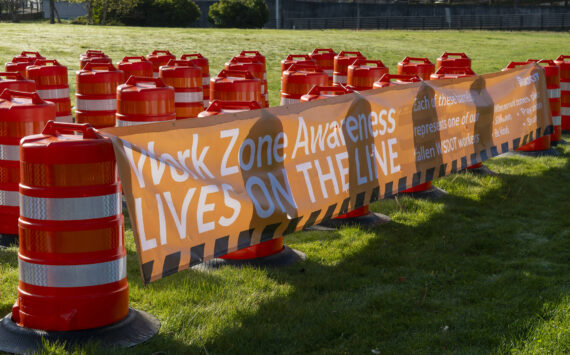Nickelsville began in 2008 as a field of bright, neon-pink tents erected in protest against then-mayor Greg Nickels’ policies toward Seattle’s homeless. So it’s appropriate that an internal dispute at the wandering camp has given birth to a new protest movement that’s fixing to revolutionize how tent cities are run in Seattle.
Right now, that just means surviving without the support of city-approved homeless service providers. In the future, it could mean more democratically organized encampments and lower barriers to shelter for couples, pets, and—perhaps most revolutionary of all—active drug users. Indeed, in what seems like a light rebuke to Nickelsville’s drug-free policy, leaders of this new movement say they hope to adopt a model in which “people who use intoxicants responsibility, people who are struggling with addiction, people in recovery, and people who choose sobriety all feel safe and supported together.”
Last month, residents of the Nickelsville encampment on Dearborn Street voted (not for the first time) to oust Scott Morrow, the controversial longtime homeless organizer who acted as a liaison between the camp and its host organizations. In response, those host organizations—the Low Income Housing Institute (LIHI), the Lutheran Church of the Good Shepherd, and property owner Coho Real Estate—asked the city to evict the encampment, which by then had renamed itself Camp Dearborn.
Three weeks later, on Friday, March 11, Seattle police did exactly that. As police cordoned off the site, residents streamed out carrying sleeping bags and guitars, and tension between the homeless and their service providers was in full view, with accusations of corruption at LIHI flying through the morning air—accusastions LIHI dismissed as absurd.
Today, the last of those Dearborn rebels have pitched their tents in a greener pasture: the Umoja PEACE Center in the Central District. There, longtime neighborhood activist Omari Tahir-Garrett has opened his backyard to the 20 or so Dearborn campers since last Monday. The camp is not authorized by the city. But, unlike at Dearborn, the owner of the property being camped upon isn’t calling for eviction, either.
On Thursday, Tahir-Garrett joined campers and concerned neighbors in a circle in that backyard where, next to a matrix of 12 camper tents, two trailers, and a kitchen tent, they sat down and hashed out what to do next. Picture a City Council meeting staffed by poor people: In beards and hoodies, eating donated fried chicken or stepping away to smoke, this ragged crew raised and seconded motions, debated them, and settled them with choruses of “ayes” and “nays.”
“It’s very different” from Nickelsville, says camper Cecilia Carey. “It’s a smaller group, but we feel safe here. We feel like we’re not people living in a homeless camp. I kind of think of it, humorously, as we’re adults in summer camp.”
This kind of democratic self-determination is supposedly integral to encampments run by SHARE/WHEEL. But the campers at Umoja describe Morrow and Sharon Lee, the executive director of LIHI, more like gangsters than champions of self-determination. “It was really hard to communicate with Scott Morrow” at Nickelsville, says Carey. “If you disagreed with him openly, you met with resistance … The more we found out [about concerns that Morrow was neglecting camp safety], the more we decided that Scott Morrow’s a danger to this camp.”
Other campers at other SHARE/WHEEL encampments dispute this.
“This kind of stuff always comes up eventually,” Matt Hannahs, a camper at the Ballard tent city, said last month when asked about allegations that Morrow is corrupt or abusive. “[Campers] don’t like how Scott will say, ‘Hey, there’s an obvious drug dealer in camp, drug dealer’s gotta go, guys, come on. We gotta get this done.’ And this drug dealer just so happens to be friends with the people in the camp, so then the camp goes, ‘Well, [Morrow] is just trying to be a tyrant and say that this person has to leave ‘cause now he thinks he’s in charge.’
“But all he’s trying to do is make sure the camp stays on task with what they’ve agreed with the people like LIHI, the people that are trying to help the camp.”
Both host Tahir-Garrett and camp organizer Polly Trout say they plan to keep the camp there indefinitely. “Frankly, even if we find a better site, we’ll probably then just have two sites,” says Trout. “Because there’s thousands and thousands of people who need a safe place to be. The next site is not going to be big enough, either.”
Asked whether encampments are just a Band-Aid and a distraction from real housing, Trout responded: “I believed that 10 years ago, and a lot of people are still waiting for housing … You make the best of your circumstances right now, and you plan for the future at the same time. You don’t have to make a choice.”
In these circumstances, right now, Trout and her cohorts hope to build a new model of encampment management. That could include strategies for welcoming homeless people who’ve been barred from more traditional encampments and shelters.
“I don’t think we’ve really looked at that [question] as a society,” says Trout. “If people are going to have to live outside in very frugal circumstances, how can we make that as healthy and functional as possible?”








